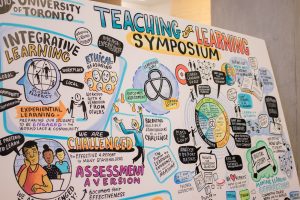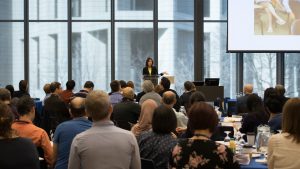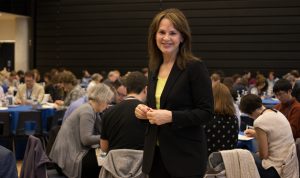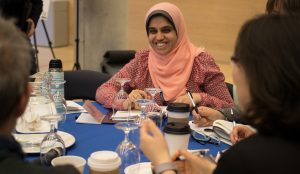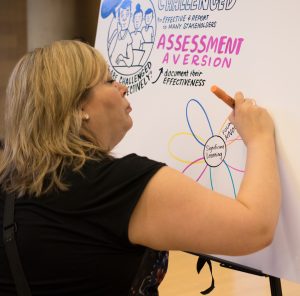2018 Experience: Integrative Learning
12th Annual University of Toronto Teaching & Learning Symposium
April 30, 2018
Desautels Hall, Rotman School of Management, University of Toronto
95 St. George Street
Thank you to everyone who attended and contributed to the rich discussion throughout the day
Questions about the Teaching and Learning Symposium can be directed to: Nancy Bakker, Coordinator, Programs & Strategic Initiatives, Centre for Teaching Support & Innovation at nancy.bakker@utoronto.ca or 416-946-0464.
SYMPOSIUM THEME
This tri-campus event, hosted by the Centre for Teaching Support & Innovation and the Desautels Centre for Integrative Thinking, Rotman School of Management, is intended to stimulate discussion and the sharing of research, practices and experiences around teaching and learning. It is a cross-divisional forum that allows faculty, librarians and staff to celebrate their commitment to teaching and learning. This year’s Symposium will take a collaborative approach to considering integrative learning in higher education in many forms, including international engagement, work-integrated learning, undergraduate research, community engagement, and a special focus on assessing integrative learning experiences.
The level of interest and engagement with experiential learning opportunities, construed broadly, continues to grow, both at the University of Toronto and within provincial, national and North American post-secondary education sectors. As a result, academic leaders, faculty members, and staff are increasingly seeking support with developing new or integrating existing pedagogical approaches to the design, implementation, and assessment of such opportunities within for-credit courses and programs.
In addition to supports for opportunities, a clear need has been identified within the University community for a framework that both unifies the range of experiences around core learning elements, while recognizing the unique elements that distinguish each approach. The University of Toronto Task Force on Experiential Learning has developed a white paper that addresses the above need, positioning the range of experiential learning modalities under the umbrella framework of Integrative Learning Experiences (ILEs):
“(ILEs) all provide students with the ability to bridge theoretical and practical learning and to observe how the material they have learned in class takes shape in the world… and include(s) examples of experiential, work-integrated, and community-engaged learning that integrate disciplinary outcomes with community engagement and competency development” (p. 10).
The 12th annual Symposium will explore ideas, issues and possibilities relating to integrative learning, course and curriculum design/renewal, and skills development – and where these intersect. How can individuals, divisions and institution look at their instruction, course design, program and curriculum development with an eye towards creating integrative learning experiences for students? What knowledge, skills and competencies are worth developing and transferring as we consider curricula and course development, and how do we integrate these? How can incorporating integrative learning experiences in your own pedagogical practices revitalize traditional modes of teaching and learning throughout myriad disciplines in order to have the widest impact on student learning? What innovations are arising within specific disciplines to challenge, provoke and rejuvenate teaching practices?
SYMPOSIUM STRUCTURE
The morning of the Symposium will be spent addressing the main theme through a facilitated design process focused on incorporating integrative learning experiences in curriculum, program and course development, renewal and design. The morning will feature a talk and facilitation by Elizabeth Barkley, co-author with Claire Howell Major and K. Patricia Cross of Collaborative Learning Techniques: A Handbook for College Faculty (2014) and author of Student Engagement Techniques: A Handbook for College Faculty (2010) and Professor of Music History at Foothills College, Los Altos, California. The keynote plenary will focus on assessment of integrative and experiential learning. Participants will examine and propose strategies and approaches to meeting these challenges in their own departments and disciplines.
Participants will actively engage with questions affecting their own teaching practice, their division and their discipline, around undergraduate, graduate and professional education at the University of Toronto. As well, participants will generate ideas for shaping the future of integrative learning at the University of Toronto.
The afternoon will be dedicated to concurrent sessions. Proposals will be accepted for the following formats. We encourage prospective participants to incorporate students into proposals, either through direct sharing of their experiences or as co-facilitators where appropriate.
PROPOSALS
Proposals will be accepted exploring the following integrations:
- Experience: Work-Integrated Learning
- Experience: Undergraduate Research
- Experience: International Engagement
- Experience: Community Engagement
- Experience: Entrepreneurship
- Experience: Assessment of Integrated Learning
Prospective facilitators are asked to identify their area of interest, and submit a general outline of the session (maximum 250 words), including outcomes (for all formats), citations (for Research on Teaching and Learning; maximum 5) and interaction processes (for workshops).
Interactive Workshops (1 hour)
Interactive workshops combine presentations or discussions with activities that engage all participants and encourage discussion and reflection. Prospective facilitators are asked to submit a general outline of the session, including outcomes and interaction processes.
Research on Teaching and Learning (completed or in-progress; 20 minutes)
Each Research on Teaching and Learning session will be one-hour in length, and comprised of three 15-minute talks, allowing 5 additional minutes for discussion at the end of each presentation.
These sessions will focus on sharing a teaching and learning-focused research project, providing a snapshot of the research design, research methods and initial findings from in-progress projects or results from a recently completed research project.
Lightning Talks (20 minutes)
These sessions will be comprised of three 15-minute Lightning Talks, allowing 5 additional minutes for discussion at the end of each presentation. The sessions will consist of moderated quick talks covering a variety of areas. Example formats for Lightning Talks include:
- Teaching strategies: these sessions will focus on sharing effective teachings strategies, including the purpose, indented outcomes, facilitation and examples. Discussion regarding how others can apply the strategies in their own teaching contexts should be addressed.
- Nifty assignments: these sessions focus on the sharing of a ‘nifty assignment’, giving details of the development and administration of the assignment, student outcomes, and strengths and challenges of the assignment. The submission of original formats is also encouraged.
Symposium-You (30 minutes)
These participant-driven roundtables, two per session, give further opportunity for reflection on issues or innovations in the disciplines, with a focus on facing challenges and problem solving.
Facilitators will be asked to prepare a conversation topic on discipline-focused teaching innovations and challenges – discussions can be based around reflections on personal innovations and practice, teaching dilemmas, or bringing forward an idea for the group to consider.
Facilitators will give a short, 5-minute introduction to their topic, followed by 25 minutes of questions, discussions and conversation. These sessions should be considered dialogical and are primarily intended to foster reflection on teaching challenges and issues, and discussion of possible creative responses drawn from both personal experience and wider sources.
Prospective facilitators are asked to submit a session title and an overarching discussion question. The submission should also include 3 to 5 discussion points that will be used to guide the Symposium-You session.
Instructions for Submission of Proposals
On the proposal submission form, you will be asked to provide a primary contact, additional presenters’ names and titles (as appropriate), session title, and abstract (max. 250 words). Proposals for research talks must include citations; we encourage participants to also include citations for other formats.
Please note: appointed faculty members, sessionals (CUPE 3902, Unit 3) and CLTAs can present; graduate or undergraduate students cannot lead a presentation but may co-present with a faculty member.
Notification of acceptance will be sent out in mid-March.
Questions about the call for proposals or proposal submissions process can be directed to: Nancy Bakker, Coordinator, Programs & Strategic Initiatives, Centre for Teaching Support & Innovation at nancy.bakker@utoronto.ca or 416-946-0464.
